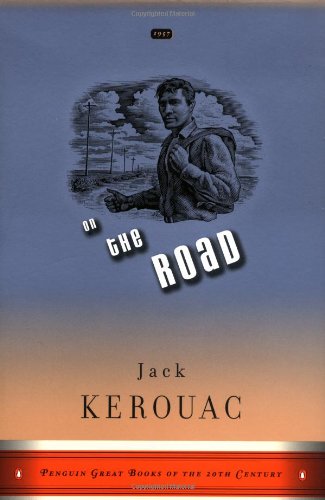Title: On the Road
(This is not the edition I physically own; it's the edition Amazon wants you to see first. Lots of reprints of this book are available.)
Author: Jack Kerouac
Date: 1957
Publisher: Viking
ISBN: 0-14-24-3725-5
Length: 307 pages
Quote: “In the month of July 1947, having saved about fifty dollars from old veteran benefits, I was ready to go to the West Coast.”
Was this a novel or a memoir? Kerouac said it was a novel, that he was more like the character he calls Sal (who “shambled after” the character he calls Dean) than like the adventure-seeking Dean, but he had been in the merchant marine, experimented with drugs, and taken road trips. He changes names, places, and identifying details in this book, and probably cleans up the more embarrassing details of his alcoholism, which was going to kill him twelve years later. According to Ann Charters, who wrote the introduction to the reprint I have, “Carlo Marx” was based on Allen Ginsberg, “Bull Lee” on William Burroughs, “Tom” on John Clellon Holmes, “Elmo” on Herbert Huncke, and “Dean” on Neal Cassady. Kerouac stopped road-tripping, though, and went home and wrote books from his mother’s house.
Dean, in the story, “spent a third of his time in the poolhall, a third in jail, and a third in the public library.” Dean was “the holy con-man with the shining mind,” and Carlo was “the sorrowful poetic con-man with the dark mind,” and narrator Sal “couldn’t keep up with them.” Still, Sal says, “the only people for me are the mad ones...mad to live, mad to talk, mad to be saved...who never yawn or say a commonplace thing.”
So they all drive across the continent, east to west and south to north, in search of adventures. And they have a few, narrated in a terse, student’s-letter-to-parents style that captivates the attention by how much it leaves to the imagination.
“I had to sleep in the railroad station on a bench; at dawn the station masters threw me out.”
“Damion’s girl suddenly socked Damion on the jaw with a roundhouse right. He stood reeling. She carried him home.”
“He talked about how bad a driver Old Bull Lee was and to demonstrate...hurled the Plymouth head-on at the truck roaring our way...and swung away at the last moment...The people in the back seat were speechless. In fact they were afraid to complain.”
“It is only seldom that you find a long Nebraskan straightaway in Iowa, and when we finally hit one Dean made his usual 110.”
“Judge said, ‘Did you know what you were doing when you attacked your friend?’ ‘Yessir, Your Honor, I did, I wanted to kill the [BLEEP] and still do.”
Kerouac didn't type "[BLEEP]." Kerouac was not writing a Google-hosted blog. He and his friends were former sailors, and he wrote the way they talked.
Kerouac didn't type "[BLEEP]." Kerouac was not writing a Google-hosted blog. He and his friends were former sailors, and he wrote the way they talked.
The happy-go-lucky road-trippers are of course drinkers, occasional stoners, racists, sexists, and selfish jerks; you’d probably prefer other companions for a road trip you were planning in real life. Nevertheless most readers enjoy On the Road. Baby-boomers liked it so much in youth that we prefer to forget that the characters belonged to the Greatest Generation, not ours.
Of the literally dozens of editions of this book that are available, several contain additions--like Kerouac's other autobiographical novels--that you may prefer to Ann Charters' commentary. Amazon has eighty, count them, eighty pages of results for a search for On the Road, although some of those results are garbage. If you want a specific edition, please specify; otherwise you'll get whichever is available at the best price at the time of mailing, for $5 per book, $5 per package, and $1 per online payment. Reprints of On the Road vary in size; there are small-print pocket-sized editions, standard-sized editions, and bulky omnibus editions where other novels are bound in. Generally four standard-sized books ship in one $5 package.

No comments:
Post a Comment